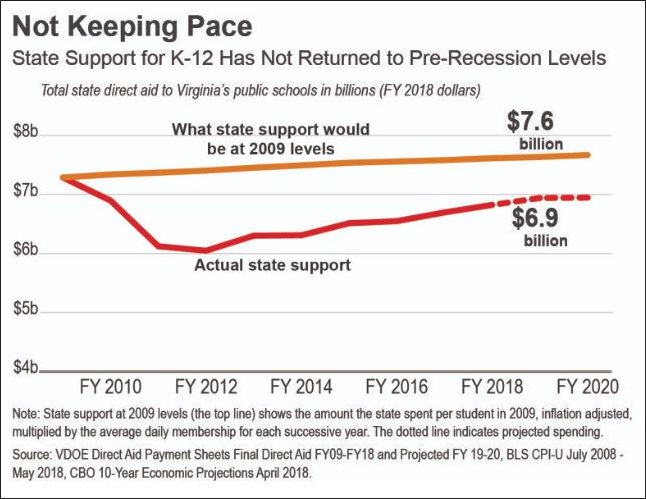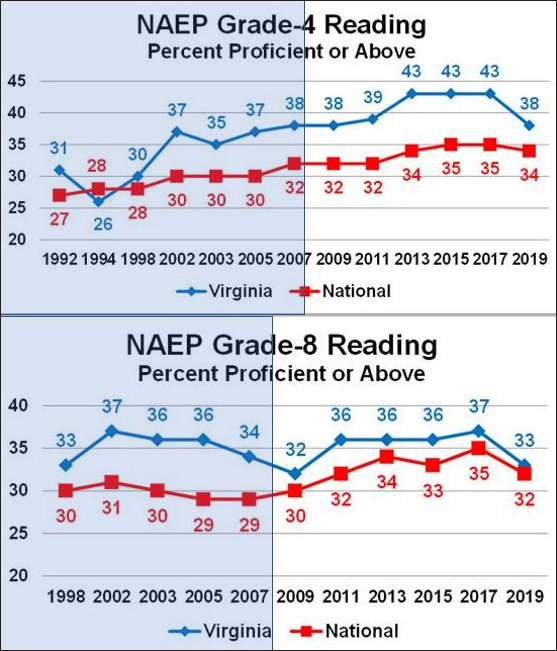The Richmond Times-Dispatch took a good hard look today at the alarming decline in reading scores by Virginia students in standardized tests, including both the state Standards of Learning (SOL) and the National Assessment of Educational Progress (NAEP). But reporter Justin Mattingly came up dry in explaining what might have caused the lower scores, which represent a stark reversal from improving or steady scores over the previous decade. “Why scores are on the decline,” he writes, “is the million dollar question.”
Mattingly makes a remarkable statement in the article that deserves highlighting: “State education leaders — who aren’t sure why the scores have dropped so much — are calling for $36 million to go toward new reading specialists.”
That’s not all they’re asking for. The State Board of Education is recommending the state increase support for K-12 education by $950 million next year. Virginia’s educrats can’t explain the decline in reading and math scores, but they still have the audacity to say, “Trust us to spend more of your money.”
The usual suspects, like the Commonwealth Institute for Fiscal Analysis, are backing them up. Providing no evidence to demonstrate an empirical link between the funding decline and student achievement, CI has been pounding the drums to remind legislators that state support, adjusted for inflation and increasing enrollment, is 8% less than before the Great Recession.
In searching for explanations, Mattingly quotes CI as noting that budget cuts have resulted in 2,239 fewer support staff members – positions such as social workers, custodians and psychologists — in Virginia schools than in 2008-09. Let’s see how CI’s fiscal numbers compare to academic performance.
As can be seen in CI’s graph above (found here) — focus on the red line (actual state support) — state support for K-12 bottomed out in Fiscal 2012 and has been recovering ever since. How does that compare to standardized test scores? This data comes from the Virginia Department of Education:
For ease of comparison, I have highlighted the post-recession years on these graphs. One can readily see that 4th-grade English reading scores continued to increase despite the cuts in spending, plateaued beginning in 2013 when spending was increasing again, and took a nose dive in the past two years. In other words, there is zero correlation between test scores and spending. Indeed, there might be a reverse correlation — more spending corresponding with lower scores.
The picture is similar for 8th graders. Reading test scores did decline in 2009 — continuing a trend that preceded the recession — then rebounded, then plateaued, and then in 2019 took a nose dive. Again, no corrrelation with state support for K-12.
If state K-12 support has nothing to do with the problem, what other explanations are floating around?
Mattingly notes the significant demographic changes that have taken place in Virginia over the past decade. The percentage of English-as-Second-Language (ESL) students has increased significantly, as has the percentage of economically disadvantaged students. Reading achievement is significantly correlated with ESL and disadvantaged status, so increasing numbers of both categories of students does create a tide against which educators must swim, to to speak. But Mattingly provides no data to suggest that the increase in ESL and disadvantaged students suddenly became a problem between 2017 and 2019.
One other possible explanation appears in the article. Mattingly quotes Valerie Robnolt, a Virginia Commonwealth University teaching and learning professor: “We’ve been so focused on teaching to the test and getting them ready for the test that sometimes we forget what the bigger picture is, which is for them to love to read and want to read.”
That explanation is so ludicrous I can’t believe it appeared in the story. While “teaching to the test” may be harmful in the way she describes, no evidence whatsoever is presented to suggest that “teaching to the test” is harmful to taking the test. Furthermore, no evidence is presented that “teaching to the test” suddenly became a huge problem in the 2017-to-2019 time frame.
(For the record, I’m not criticizing Mattingly, who is a conscientious reporter and one of the more productive writers on the Times-Dispatch staff. I’m criticizing the sources to whom he gives voice. Justin, you need to reach out and get more diverse points of view.)
It is safe to say that Virginia’s educational establishment has no clue what is happening. Yet there is a hint — perhaps it’s more accurate to call it a hint of a hint — in Mattingly’s story as to what’s going on. The decline in NAEP scores was a national phenomenon (though not as marked as in Virginia). Only one state — Mississippi — saw statistically significant increases to 4th-grade reading this year. Normally, we associate Mississippi with poor educational outcomes (indeed, Mississippi students might have improved from a low base) and low levels of educational spending. What else could account for its improvement?
Here’s a hypothesis: Mississippi is one of the most politically and culturally conservative states in the country, and its educational establishment, though not immune to the winds of political correctness and the “social equity” movement sweeping the country, is more resistant to it than other states.
Regardless of what may or may not be happening in Mississippi, we know that Virginia is the polar opposite of un-PC. The defining characteristic of Northam administration education policy over the past two years has been offsetting Governor Northam’s blackface embarassment with an emphasis on racial equity. The new policy has manifested itself in two ways: (1) by accelerating the imposition of “restorative justice” disciplinary policies in schools, already underway from previous years, and (2) indoctrinating teachers, staff, and administrators with racial-equity consciousness.
The bottom line: Never before has Virginia’s educational establishment been so politically correct and devoted to explicit racial-justice policies. Yes, previous administrations have sought to address the racial gap in educational outcomes, but none of them put “racial equity” as front and center as Northam has.
Now, there is only one person in the Commonwealth of Virginia who stuck out his neck in a public forum to argue that the restorative-justice disciplinary policies would have precisely the opposite effect intended and predicted that test scores would decline — and that is me. No one else saw this coming. So, I believe that my hypothesis of what’s behind the declining test scores deserves closer scrutiny.
I will go one step farther: Unless Northam reins in his social justice warriors, we will continue to see eroding reading and math achievement regardless of how much money we pump into a failing educational system. As always, those who suffer the most will be the minority students that the social-justice warriors purport to help. If Republicans want a good campaign issue two days before the 2019 legislative elections, they might try arguing that Northam is destroying Virginia’s public education system.




Leave a Reply
You must be logged in to post a comment.